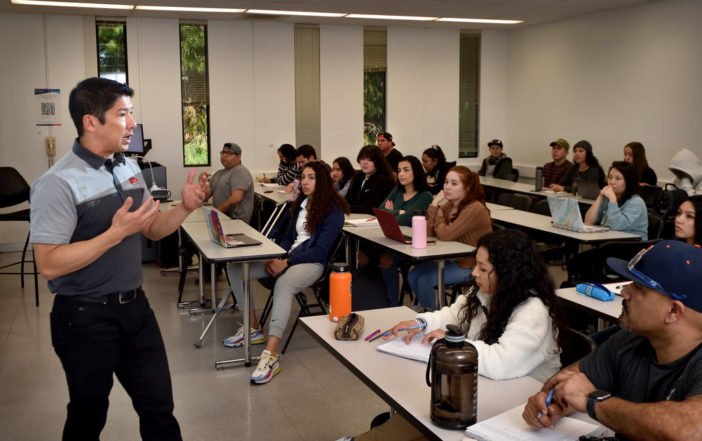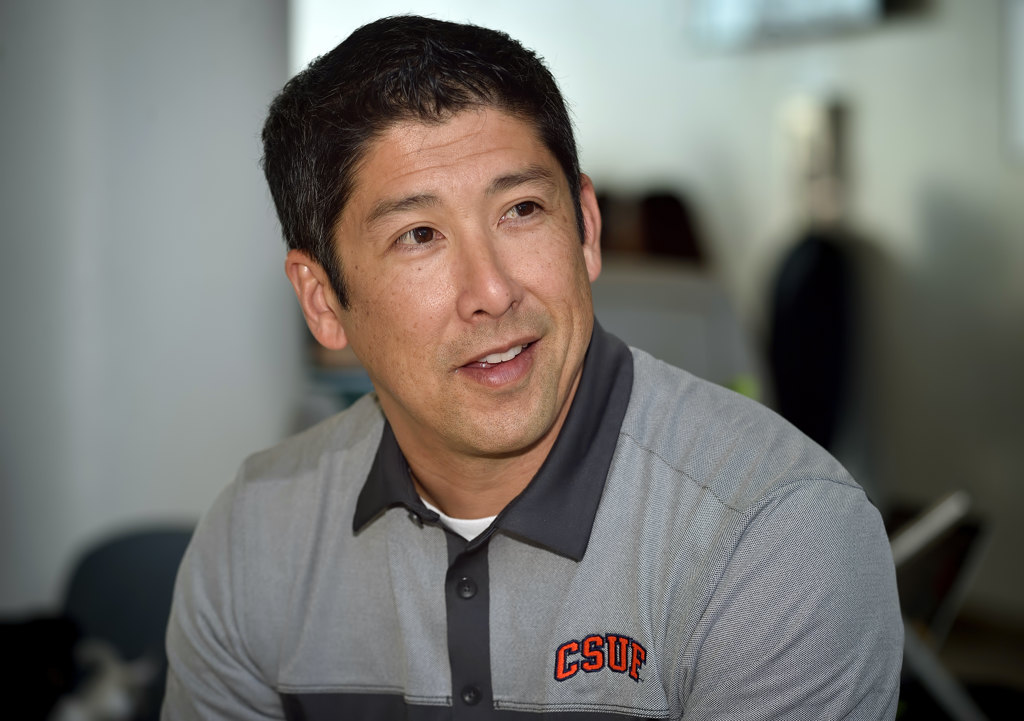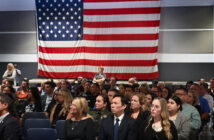Anaheim PD Sgt. Darrin Lee remembers the student well.
“About a year ago, I had an activist in my class, a prison reformist in his 30s, a man who visited prisons throughout California,” says Lee, who as a part-time lecturer has been teaching courses in criminology and related subjects, such as juvenile delinquency and social inequality, for 15 years at California State University, Fullerton.
“On the first day of class, when I told the students I was a police officer, he raised his hand,” recalls Lee, a 26-year law enforcement veteran who’s been at the APD for 20 years.
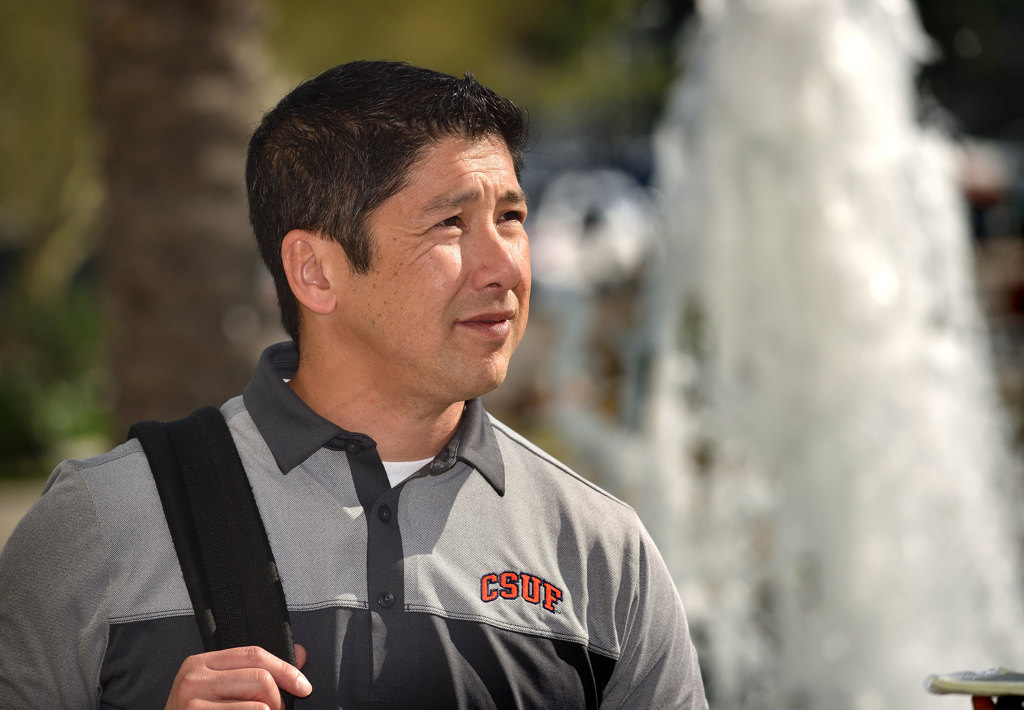
Anaheim PD Sgt. Darrin Lee teaches classes at Cal State University, Fullerton that include Social Inequality, Sociology of City Life, Deviant Behavior, Criminology, and Law & Society.
Photo by Steven Georges/Behind the Badge
“He says, ‘Wait a minute, you’re a practicing police officer?”
Yes, Lee told him.
The activist let out a sigh of disappointment and shook his head.
On the second day of class, Lee heard the man whisper to another student:
“I love this class.”
And after sitting through the entire semester, he had a change of heart, taking a moment to thank Lee.
“He told me, ‘I was thinking you were going to give me the whole dog-and-pony show from the law enforcement perspective,’” Lee recalls. “He said, ‘Mr. Lee, thank you so much for not forcing your opinions down our throats and for being unbiased. You allowed me to see the criminal justice system in a different light.’’
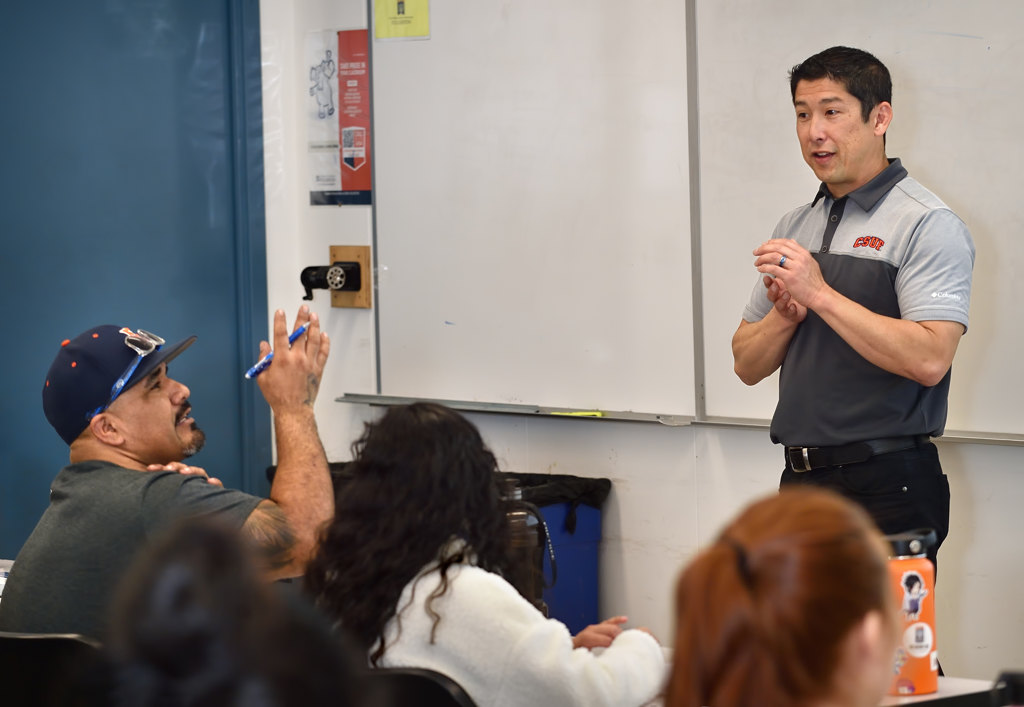
Darrin Lee takes questions from a student during a criminology class at Cal State University, Fullerton.
Photo by Steven Georges/Behind the Badge
Such reactions weren’t always common.
When Lee first started teaching at CSUF in 2005, he says he taught through a cop’s lens.
“I used to come in with a police agenda,” Lee says. “I would walk into the classroom and think, ‘I’m going to show these students a police-centered perspective on things.’
“And so what I ended up doing was stifling the critical thinking in the classroom. I started creating what I thought were robots that were essentially trying to mimic what I was thinking. And that was bad.”
Lee, 50, has had years to hone his teaching craft. About five years ago, he tweaked his approach to instructing.
“My role is to get into the classroom and teach my sociology students, who tend to hold strong biases, to be critical thinkers and not look at the media and believe everything they see and read,” Lee says.
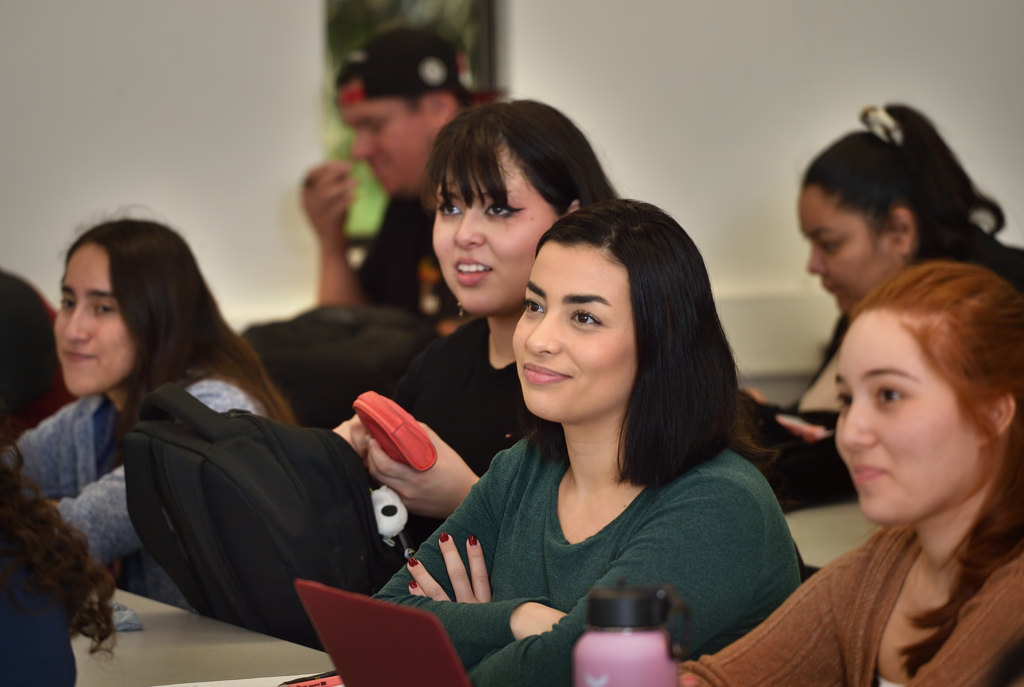
Students listen as Darrin Lee teaches a class in criminology at CSUF.
Photo by Steven Georges/Behind the Badge
“My role as a police officer and university instructor is not to just push the police agenda, but push the creative thinking agenda so these up-and-coming police administrators and probation officers can form their own educated opinions on policy decisions.”
For example, take the concept of racial bias in policing.
“I used to say, ‘I profile the behavior, not the person,’” Lee says, “but I ignored the reality and the research that said there’s a disparity in the number of times blacks get pulled over compared to white people. The research is out there. And I would gloss over that.
“I need to acknowledge that there is racial bias in the world. So that’s what I do now. I acknowledge it, I own it, and then we talk about it.
“So my teaching philosophy is different. What I used to do was lecture, just stand up in the classroom and talk. It was a one-way discussion.
“Now, I create dialogue with what I call my ‘essential questions.’ These questions cause students to think, debate, and discuss. And at the end of the semester, we’ve created students that haven’t been spoon-fed the information, but have come up with the information on their own.”
TEACHING IN HIS BLOOD
Lee, who grew up in Alhambra, always thought about becoming a teacher.
“As a high school kid,” he says, “I wanted to help people and then discovered that I could do it and have fun outdoors and chase bad guys and get the adrenaline rush.”
Lee graduated from Cal State University, Los Angeles with a degree in criminal justice and, after working as a campus supervisor and substitute teacher for a short time, he entered the Rio Hondo Police Academy in Whittier, in 1994.
Lee was a police officer in Covina for six years before he transferred to the APD in 2000.
He earned a master’s degree in sociology in 2002 and three years later started teaching at CSUF.
On a recent weekday before his criminology class started at 4 p.m., Lee, wearing a CSUF polo shirt, discussed his passion for teaching.
“In the climate that we’re now in regarding law enforcement, I think it’s important that we send the right message to the public. Rather than letting others write the narrative about law enforcement, law enforcement should take an active role.”
Lee teaches in the Sociology Department.
“We value having Darrin Lee bring his experience and hands-on teaching which gives students a practical perspective to consider along with their more theoretical courses,” said Eileen Walsh, professor of sociology and department chair.
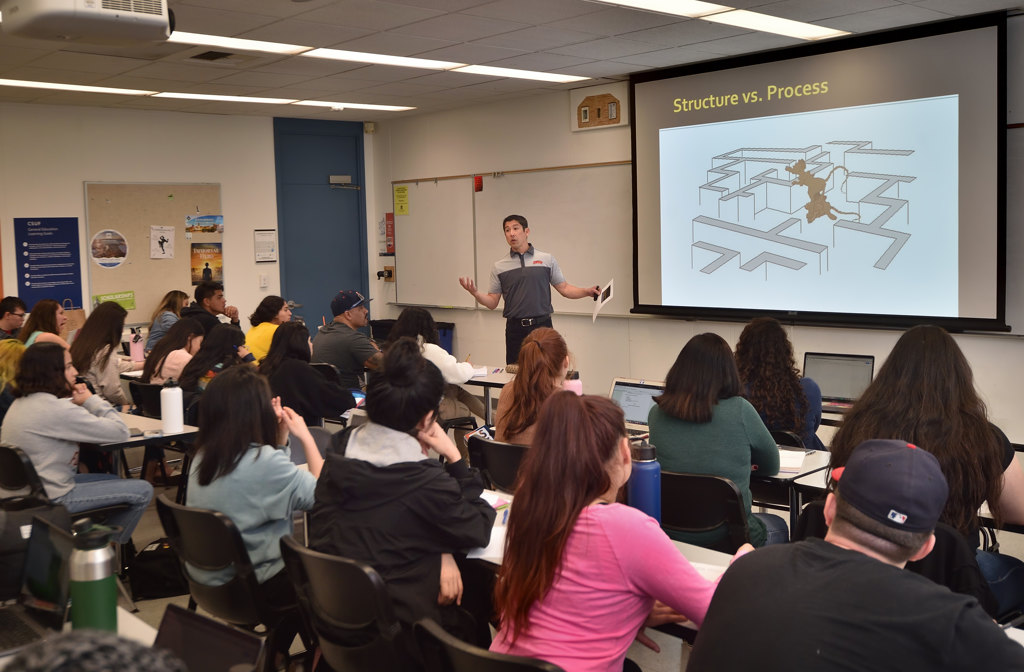
APD Sgt. Darrin Lee discusses the social-structural approach to criminal behavior in his criminology class at Cal State University, Fullerton.
Photo by Steven Georges/Behind the Badge
Lee, who works as a sergeant from 6 a.m. to 4 p.m. and teaches after that, says he loves to teach and that he thinks he can “make a difference in the world.”
He brings real-life anecdotes from his job as a police officer into the classroom.
At the start of his recent criminology class, Lee told a story about chasing down and arresting a gangster. His story-telling skills kept the students’ interest.
Lee, who at the APD has served for eight years as coordinator of the agency’s 25-person Peer Support Team, says he has taught several of the department’s own cadets and he has also successfully recruited past students to become APD cadets.
One former student, he says, works as a police officer at the Orange PD and another is a case worker at Boys Republic, a treatment facility for troubled youth.
“One of the greatest things about teaching is going in and getting people who think a certain way to change their minds,” says Lee, who has three children, 19-year-old twins and a 13-year-old.
Lee says his wife encouraged him to teach and is constantly suggesting ways to improve his effectiveness. Currently, Lee is a sergeant attached to the burglary and auto theft detail.
Lisa Lee is a longtime teacher at Townsend Junior High School in Chino Hills.
“You know, Darrin, these students don’t want to hear you talk,” Lisa Lee told her husband. “They want to provide input and feedback and they want a dialogue. And when you allow them to do that, their learning results in a deeper understanding.”
Lee has gotten the message.
 Behind the Badge
Behind the Badge
